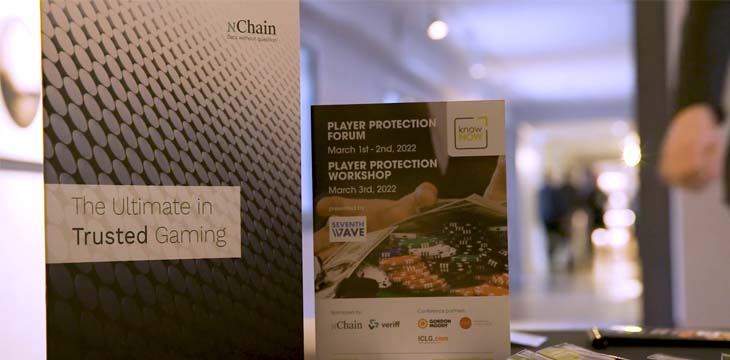|
Getting your Trinity Audio player ready...
|
The Player Protection Forum is an annual event for the gambling industry organized by KnowNow and solely dedicated to responsible gambling initiatives.
Responsible gambling has always been an important topic within the gambling industry, but only recently the industry is hearing about blockchain-powered technology that provides solutions to the classic pain points in this area.
In their continued effort to educate the iGaming space on BSV blockchain-powered Kensei, nChain had a big presence at the event alongside two iGaming suppliers they are integrating with—Crucial Compliance and W2.
“Blockchain is incredibly complicated, it’s very mathematical and is a company going to adopt a blockchain strategy and go and hire loads of blockchain engineers and developers? No, they’re not,” said Nick Hill, Sales Director for nChain.
“So what we’ve done with Kensei is obviously simplify that. And we’ve built that box, that intermediary between the legacy technologies and the complexities of blockchain and just simplified the entire process with simple API integration,” he explained.
“With the development of Kensei and also the development and some of the relationships that we’ve built with our partners, like Crucial Compliance and W2, we’ve now got product. We’ve actually got a real-life product that we can take out to the marketplace,” Hill added.
Crucial Compliance, the first of Kensei’s iGaming partners, provides a behavioral monitoring system designed to alert operators if their players are exhibiting unsafe gambling behavior. Paul Foster, CEO of Crucial Compliance, decided to integrate with Kensei after learning about the “insurance policy” its data time stamping functionality provides.
“We’re creating a blockchain irrefutable ledger of actions that you’ve taken as an operator in a responsible gaming space and the AML space. So when it comes to player protection, you can put all that key data on the chain and you can prove what you’ve done,” Foster revealed.
The W2 platform, Kensei’s latest iGaming partner, provides regulatory compliance services in the form of KYC, AML and identity verification. After hearing about Kensei, W2 CEO Warren Russell recognized that plugging into the blockchain-powered solution could do wonders for his business and the iGaming industry at large.
“The main thing for our customers is the compliance aspect and the whole irrefutable nature of what they do—proving what they can do—is of paramount importance,” Russell confirmed.
“If you look at the fines that have been levied, typically it’s not because they haven’t done something, its often because they can’t prove that they’ve done it. So being able to have that proof is really important,” Russell emphasized.
“And one of the other ways we’re looking at it is how you can start sharing identity amongst different operators, trying to reduce the cost, reduce the burden for the operators and the players and even across verticals. Blockchain seems like it could be a good answer to that,” Russell added.
While we can clearly see the superior technical capabilities of blockchain-powered solutions after hearing from Hill, Foster and Russell, most people have yet to be educated on the true utility of blockchain.
“What we’re doing here is trying to actually educate the people around here about how we use [blockchain] what we’re going to use it for and why we’re going to use it. And also separate that crypto from blockchain. We’re still working on that,” Foster said.
“I’ve said so many times educate, educate, educate, because people don’t or the industry just simply still has got in that mindset of blockchain, ‘oh its crypto, oh it’s this.’ No, it’s a utility application,” Hill added.
“Blockchain is nothing more than an immutable timestamp record. Can that save the world? No. Can it validate a chain of events? Absolutely, it can,” said Phil Runyan, an expert in blockchain and gaming and a consultant to nChain.
nChain’s Business Development Ai Ishii pointed out how iGaming professionals don’t initially make the connection between blockchain and responsible gambling, but once they see the actual use case, it all becomes clear.
“We can even talk about our usage case without the word blockchain in it,” she confirmed.
Russell advised avoiding the word blockchain to begin with—rather, focus on the problem you are solving and then explain that blockchain is involved.
“I think ultimately what we as an industry need to understand is how it can be applied, not what it’s called,” he said.
Foster agreed and added, “We literally say this is the system you’re getting. This is the reason you’re buying it. But isn’t it great if we can take the data that’s in the back of it and make sure it’s there for life?”
“And they love that idea, and it’s only then do we actually tell them the way we do it is it’s on the blockchain,” Foster said.

 03-03-2026
03-03-2026 




